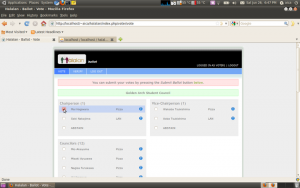Halalan: Difference between revisions
New page: Halalan is an open-source voting system designed for student elections. It aims to automate the manual processes of elections such as counting, archiving, and voting. It is designed to be ... |
Added additional hosting information regarding Halalan |
||
| (5 intermediate revisions by 2 users not shown) | |||
| Line 1: | Line 1: | ||
Halalan is an open-source voting system designed for student elections. It aims to automate the manual processes of elections such as counting, archiving, and voting. It is designed to be easy | Halalan is an open-source voting system designed for student elections. It aims to automate the manual processes of elections such as counting, archiving, and voting. It is designed to be easy to use and secure. | ||
Halalan is released under the [http://www.gnu.org/licenses/gpl.html GNU GPL v3 License]. It is currently being maintained by the [[UP Linux Users Group]]<ref>[http://halalan.uplug.org/about/ About Halalan]</ref>, and is currently hosted at [http://code.google.com/p/halalan/ Google Code]. | |||
[[Image:Unplug_halalan.png|thumb|Halalan 1.5.1 Screenshot (from http://code.google.com/p/halalan/)]] | |||
| Line 15: | Line 19: | ||
==Botong Isko 2010== | ==Botong Isko 2010== | ||
Halalan was also used in Botong Isko 2010: an online mock polls for Clean, Transparent, and Honest Elections last . The elections was a mock poll/ survey for the upcoming 2010 National Elections which ran from March 18 to 25, 2010. Only positions in the national-level were included in the elections. Some 48,860 students from the UP System were included in the roster of voters although only 8.10% of those actually participated in the mock polls. | Halalan was also used in Botong Isko 2010: an online mock polls for Clean, Transparent, and Honest Elections last . The elections was a mock poll/ survey for the upcoming 2010 National Elections which ran from March 18 to 25, 2010. Only positions in the national-level were included in the elections. Some 48,860 students from the UP System were included in the roster of voters although only 8.10% of those actually participated in the mock polls. | ||
=Links= | |||
* [http://code.google.com/p/halalan/ Halalan Code Repository] | |||
* [http://halalan.uplug.org/ Halalan Blog] | |||
Latest revision as of 00:11, 12 August 2011
Halalan is an open-source voting system designed for student elections. It aims to automate the manual processes of elections such as counting, archiving, and voting. It is designed to be easy to use and secure.
Halalan is released under the GNU GPL v3 License. It is currently being maintained by the UP Linux Users Group[1], and is currently hosted at Google Code.

Objectives
- Develop an easy-to-use and secure voting system for student elections to lower their costs and make them run efficiently.
- Prove that the result of a computerized election is valid and trustworthy.
- Increase voters turnout by providing a convenient way to vote.
Elections using Halalan
University-wide UP Student Council Elections
Halalan was deployed in a university-wide scale for the first time during the 2009 University-wide Student Council Elections although it has already been used in college-level elections for the past years. Its deployment in the university-wide scale was a success. Winning candidates for University-wide positions were proclaimed at Vinzons Hall less than an hour after the elections closed.
It was also used in the 2010 University-wide Student Council Elections.
Botong Isko 2010
Halalan was also used in Botong Isko 2010: an online mock polls for Clean, Transparent, and Honest Elections last . The elections was a mock poll/ survey for the upcoming 2010 National Elections which ran from March 18 to 25, 2010. Only positions in the national-level were included in the elections. Some 48,860 students from the UP System were included in the roster of voters although only 8.10% of those actually participated in the mock polls.


